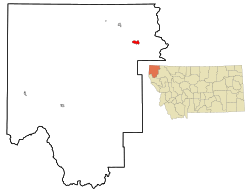Fortine, Montana facts for kids
Quick facts for kids
Fortine, Montana
|
|
|---|---|

Location of Fortine, Montana
|
|
| Country | United States |
| State | Montana |
| County | Lincoln |
| Area | |
| • Total | 7.16 sq mi (18.55 km2) |
| • Land | 7.09 sq mi (18.36 km2) |
| • Water | 0.07 sq mi (0.18 km2) |
| Elevation | 2,973 ft (906 m) |
| Population
(2020)
|
|
| • Total | 317 |
| • Density | 44.71/sq mi (17.26/km2) |
| Time zone | UTC-7 (Mountain (MST)) |
| • Summer (DST) | UTC-6 (MDT) |
| ZIP code |
59918
|
| Area code(s) | 406 |
| FIPS code | 30-28150 |
| GNIS feature ID | 0771521 |
Fortine is a small community in Lincoln County, Montana, United States. It's called a census-designated place (CDP). This means it's an area that looks like a town but isn't officially set up as one. In 2021, about 206 people lived there.
Geography of Fortine
Fortine is located in the northeastern part of Lincoln County. You can find it at these coordinates: 48°45′52″N 114°54′11″W / 48.76444°N 114.90306°W.
U.S. Route 93 is a main road that goes right through Fortine. If you travel northwest on this road, you'll reach Eureka in about 11 miles (18 km). If you go southeast, you'll get to Whitefish, which is about 40 miles (64 km) away.
The community covers an area of about 7.1 square miles (18.5 km2). Most of this area is land, with a small part being water. Fortine is in a valley where Fortine Creek flows. Other smaller creeks, Deep Creek and Murphy Creek, join Fortine Creek here. Fortine Creek then flows northwest into the Tobacco River. The Tobacco River eventually joins the Kootenai River, which is part of the larger Columbia River system.
History of Fortine
Fortine was named after an early settler named Octave Fortin. The town became a stop along the Great Northern Railway line. This was an important train route that helped connect different parts of the country. The first post office in Fortine opened in 1905.
Like many other towns in northwestern Montana, Fortine grew a lot because of the timber industry. This industry involves cutting down trees and processing wood. Between 1908 and 1928, the timber business was very strong, which helped Fortine become a busy and successful place.
Population of Fortine
| Historical population | |||
|---|---|---|---|
| Census | Pop. | %± | |
| 2020 | 317 | — | |
| U.S. Decennial Census | |||
According to the census from 2000, there were 169 people living in Fortine. These people lived in 74 households, and 48 of those were families.
The population included people of different ages. About 24% of the people were under 18 years old. Around 17% were 65 years or older. The average age of people in Fortine was 45 years old. For every 100 females, there were about 96 males.
The median income for a household in Fortine was $26,500. This means that half of the households earned more than this amount, and half earned less. For families, the median income was $35,625.
See also
 In Spanish: Fortine (Montana) para niños
In Spanish: Fortine (Montana) para niños
 | Laphonza Butler |
 | Daisy Bates |
 | Elizabeth Piper Ensley |

